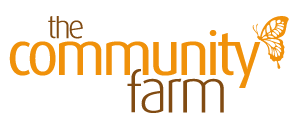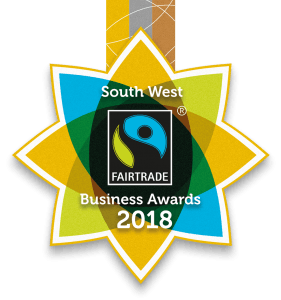I’m not sure the furthest anyone has traveled for a one-off visit to The Farm, but Meyling González, coming all the way from Nicaragua, likely takes the prize!
Her visit came about partly due to another prize-winning attempt: that of Bristol to be recognised as a Gold Sustainable Food City through its “Going for Gold” programme. According to their website, this initiative “celebrates and supports communities that are making positive changes to their food system. As one of only four cities to achieve Silver status, Bristol has already shown that it has the motivation to make Good Food part of the city’s identity.”
One element of the Going for Gold programme involves the championing of local procurement and the use of transparent supply chains. Meyling and her family operate a small Fairtrade coffee farm (as part of the SOPPEXCCA co-operative) in the community of El Salto in the department of Jinotega, where small-scale farmers can suffer from poor working conditions and unfair prices due to the long commodity supply chains. The Fairtrade system helps small scale farmers have a voice within supply chains, and enables them to obtain fairer prices for their produce, something which we echo in our ethos and ways of working here at The Farm.
Thanks to Bristol City Council and the European Union’s Fairtrade Advocacy Office, Meyling received a grant to travel to Bristol and speak about the benefits of Fairtrade to various businesses and organisations. She also entered into farmer-to-farmer dialogues to share best practices and experiences, hence the reason for her visit to The Farm.
Meyling’s community has struggled in the past with issues similar to those which we find in our own communities – mental health problems, diminishing social involvement for young people, gender inequality, and environmental degradation – so she was curious to learn more about the work that we do here, both in terms of how we farm using organic, regenerative principles, and also how we create opportunities for people to get on our land and reap the benefits of time outdoors with hands in the soil.
Her visit took place on Tuesday, 12th November. She arrived well-prepared (wellies and a scarf!) to walk around the farm with a few of our staff, a translator and members of various local organisations with similar interests: Bristol Link with Nicaragua (BLINC), Bristol Fairtrade Network and the Bristol City Council. The weather was most certainly not in our favour, but we shivered and laughed our way through the fields while Ped, our managing director, shared The Farm’s story and answered questions. Meyling was very kind to gift us a bag of coffee from her farm (which was delicious – thank you, Meyling!) and also to provide feedback following her visit, courtesy of Charlotte Harvey, her interpreter:
“It was a completely new experience for her. She’s keen to implement some similar initiatives back home, most notably the organic box scheme. They currently use plastic to transport their vegetables, which is something she is eager to change.
One thing she found particularly striking was the fact that volunteers play a crucial role on your farm. In Nicaragua, if people work on a farm they do so purely to earn a living. Along these lines, she found it interesting that making money is not the sole focus of your work. The concept of running the farm to educate people and support the community is something she liked very much!
Finally, she was impressed with the work undertaken at the farm to protect the soil and nature in the area, since this is an important aspect of her work too. The range of produce grown also surprised her and I think she was most impressed by the wide variety of cabbages/squash and of course the apples (which are very different to the ones back home!).
Overall it seems like she had a really positive experience and she asked me to congratulate you on your work and thank you for the opportunity!”
From our side, it was most interesting and concerning to learn about the environmental challenges facing Meyling and her family in Nicaragua, such as how creeping changes in the climate have affected their crop yield. She lamented how, year on year, the “muddy” season has been getting longer, and that attempts to manage the increasing amount of rain, the rising number of landslides and the increased risk of coffee plant fungal infections (that come with higher humidity) have been a real struggle. It does seem as though those farming in the tropics are facing first-hand the realities of climate change, but, since they lack a voice, the rest of the world remains mostly oblivious. Do we really need to wait for coffee prices to spike before we pay attention?
By Going for Gold in Bristol, we are “collectively changing the way the city produces, buys and eats food,” with the result being that “we can have a hugely positive impact on the environment, our health, wildlife and communities, and tackle some of the leading causes of climate change.” Sounds good to us at The Farm!
Join one of our free New Year wellbeing courses Book on here
About Us
- Home
- About Us
- News from The Farm
- Going For (Black, Caffeinated) Gold: A Fairtrade Nicaraguan coffee producer visits The Farm

Search
Going For (Black, Caffeinated) Gold: A Fairtrade Nicaraguan coffee producer visits The Farm
- Details

Our Most Popular Boxes
Do we deliver to you?
We deliver to Bristol, Bath, Chew Valley, Weston-Super-Mare, Frome and plenty of places in-between!
The Community Farm
Denny Lane
Chew Magna
Bristol BS40 8SZ
Our Outlets
Saturdays 9am-2pm
The same wonderful, organic produce that goes into our veg boxes is available for sale at The Farm's Veg Shed.
The Community Farm is a not-for-profit organisation, registered with the Financial Conduct Authority as a Community Benefit Society.
Our registration number on the Mutuals Public Register is 31018 R. Our companies Number at Companies House is IP031018
© 2025 The Community Farm












